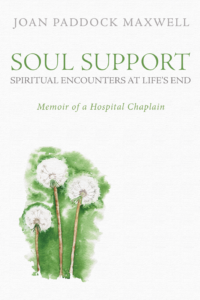Deep Diving
Article by Joan Paddock Maxwell (June 2018 eNews)
Over the years I’ve spent about two hundred hours scuba diving. One of the many fascinating parts of the scuba experience is the increasing quiet you encounter as you go further below the ocean’s surface. I used to love to swim down to one hundred feet and simply float, holding my breath a moment to eliminate the loud noise of my breathing and enjoying the enormous silence of the depths.
For me, one of the most remarkable things about encounters in the chaplaincy was how deep they could go in a matter of moments, even with complete strangers. Time seemed to be unrelated to the institutional clock on the wall. Silences were flooded with unspoken communication. The profundity of these encounters often felt like soul-to-soul exchanges.
Several factors influenced these encounters. One was the medications the patient was receiving, some of which can sharply reduce the usual self-protective barriers people erect between themselves and strangers. Another was the particular experience the patient was having. Giving birth, suddenly learning you have a serious family problem, and, especially, being told you have only a short time to live, jolts most people out of their usual protective shell.
Another cause of these profound encounters relates particularly to chaplains and mental health professionals. One of the skills we are taught is called reflective listening. It is a special way of being with someone. You listen intently and single mindedly to what they are saying and reflect their words back to them in a way that shows them how closely you have heard them. This reflection often enables them to become aware of what’s going on inside them. Only when we are aware of how we feel about something can we go to the next step, which can range from simply experiencing the emotion in the presence of a sympathetic other person to taking some sort of action.
… Another skill encouraged in chaplaincy training is the ability to be fully present to the other person—truly “there”—whether that person is a patient, a family member, or a fellow staffer. Although this sounds simple, it’s in fact remarkably difficult. To be fully present means that you’re listening with your whole heart. Some spiritual teachers say you must put your mind in your heart. That sounds like a figure of speech, but I found it a helpful instruction.
… Most people have never been listened to in this way, and find that the experience of being truly heard by another’s open heart opens their own in response. We all have a need to tell our feelings, our story, and be heard. When we are face to face with our mortality, that need is intense.
When I was allowed to hear another’s story, my heart opened as wide as wide.
One other force causes chaplain encounters to go deep. It is, I believe, the intervention of what Christians call the Holy Spirit. This force is not under the control of the chaplain, or of anyone, but in my experience it is always present. Before going on duty I always offered my inner bing to the disposal of the Spirit, and time after time I would find myself saying or doing things that surprised me but that opened a deeper level of communication between me and the other person.
… Over time, as I used reflective listening, listened with an increasingly open heart, and relied on the Spirit’s guidance, I found to my surprise that people reacted differently to me. They opened up faster and went deeper.
After I had been a chaplain for several years, a dear friend said to me, “Joan, you’ve changed. I don’t think you even know it, but you’re different.” When I asked her what she meant, she couldn’t explain, and I certainly was not aware of it; but that difference manifested itself in the increasing intimacy of my encounters. Upon reflection, I suspect that was a result of my more open heart, and to my increasing attention to the presence and action of the Spirit.
—
This article is excerpted from Joan’s new book, Soul Support—Spiritual Encounters at Life’s End: Memoir of a Hospital Chaplain, published by Resource Publications, Eugene, Oregon, 2017. Used by permission of Wipf and Stock Publishers, www.wipfandstock.com. Copyright © Joan Paddock Maxwell.
Joan has generously donated all profits from the sale of her book to Shalem’s ministry. Also, based on what she learned from her patients, she has developed some talks for the general public about ways to provide spiritual and psychological support to family and friends who are dying. She has given them to groups in Texas, Utah, Maine, Massachusetts, and Washington, DC. She also offers workshops on the same subject for chaplains and hospice nurses. For more information, go to her website at www.joanpmaxwell.com.

